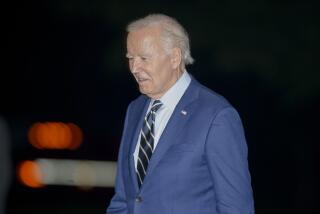Obama goes out on a limb for Middle East peace talks
Reporting from Washington — After 18 months of faltering efforts to launch Middle East peace negotiations, President Obama is dramatically increasing his personal stake and his own political risk by hosting direct talks this week.
Obama personally helped coax Israeli Prime Minister Benjamin Netanyahu and Palestinian Authority President Mahmoud Abbas to come to Washington to meet with him Wednesday and resume talks the next day.
Some of Obama’s advisors have questioned the wisdom of linking the president so visibly with such an intractable conflict. But the president stepped up his personal involvement over the summer, holding face-to-face meetings and follow-up phone calls with Abbas and Netanyahu.
Few believe the announced goal of completing a peace deal within a year is realistic, but Abbas resisted joining the talks until the White House and the Israelis agreed to the one-year goal.
Many insiders and outside experts say that if the talks remain on track, it will be because Obama is personally applying pressure to push them forward.
“This time, the White House has to be more active, more robust and more devoted,” said Maen Rashid Areikat, the Palestinian Liberation Organization’s ambassador to the United States. “We have seen gatherings like this before.... This time we need a serious approach.”
Obama will hold individual meetings with Abbas and Netanyahu in the Oval Office on Wednesday, followed by a White House dinner that will include Egyptian President Hosni Mubarak, Jordan’s King Abdullah II and former British Prime Minister Tony Blair, who serves as Middle East envoy for the so-called quartet of the United States, Russia, the United Nations and the European Union.
After 20 months without a face-to-face meeting, Netanyahu and Abbas will begin direct talks the next day at the State Department with Secretary of State Hillary Rodham Clinton.
Obama is expected to make a public appearance to underscore his personal association with the talks.
“He will become engaged at any point where people think he should,” said a senior administration official who, like others, spoke on condition of anonymity in advance of the talks. “He will take the advice of his team, but there’s no doubt he has put a lot of time and energy into this.”
Obama dived into Middle East politics very early in his presidency. His first telephone calls to foreign leaders as president included the elected Palestinian and Israeli officials. And he named his envoy to the region even before his Cabinet was fully formed.
“Deep presidential engagement will be a sign, in itself, of progress,” said Jon Alterman, director of the Middle East program at the Center for Strategic and International Studies. “Presidents don’t like to be seen putting a lot of time into something that isn’t going well.”
U.S. officials don’t expect to announce resolution of any key issues this week. Instead, the meeting is just the “beginning of a process,” said one official. The decisions that emerge from the summit probably will be about the “pace and scope” of future negotiations.
Israeli and Palestinian officials have continued to wage a war of words as the talks approach. Ziad Asali, president of the American Task Force on Palestine, an advocacy group in Washington, said the harsh rhetoric makes the talks more difficult.
The most immediate threat to the talks is the scheduled Sept. 26 expiration of Israel’s partial moratorium on construction in the West Bank, occupied by Israel in 1967. Palestinians have said they would walk out on the talks if the freeze is not extended.
The Obama administration has called on Israel to exercise restraint in new construction.
“The administration understands that the extension is absolutely vital, and if it slips, it’s a huge blow to their prestige,” said Scott Lasensky, of the U.S. Institute of Peace.
Analysts said the Israelis could address the issue by quietly halting most expansion without formally announcing it.
Many experts believe that a moment of truth for Obama will arrive when the two sides reach impasse, perhaps by next year. Administration officials have signaled that they may offer “bridging proposals.”
The administration also may be tempted to go further, offering something that approaches to its own peace plan, as former President Clinton did just before leaving office. Palestinians would welcome such a move, but Israelis would be wary.
If the president tries to resolve an impasse by pressuring the Israelis for concessions, it would antagonize the Jewish state’s leaders and their staunch American supporters.
A key question this week will be whether Obama can help cultivate personal and diplomatic chemistry between Abbas and Netanyahu, whose relationship has been long but rocky.
“They’ve essentially joined this process because they don’t want to be blamed for its failure,” said Robert Danin, a former deputy to Blair who is now with the Council on Foreign Relations. “That’s not ideal. But the U.S. has a lot of clout, and it will continue to press them, hoping that some chemistry will develop.”
More to Read
Sign up for Essential California
The most important California stories and recommendations in your inbox every morning.
You may occasionally receive promotional content from the Los Angeles Times.












